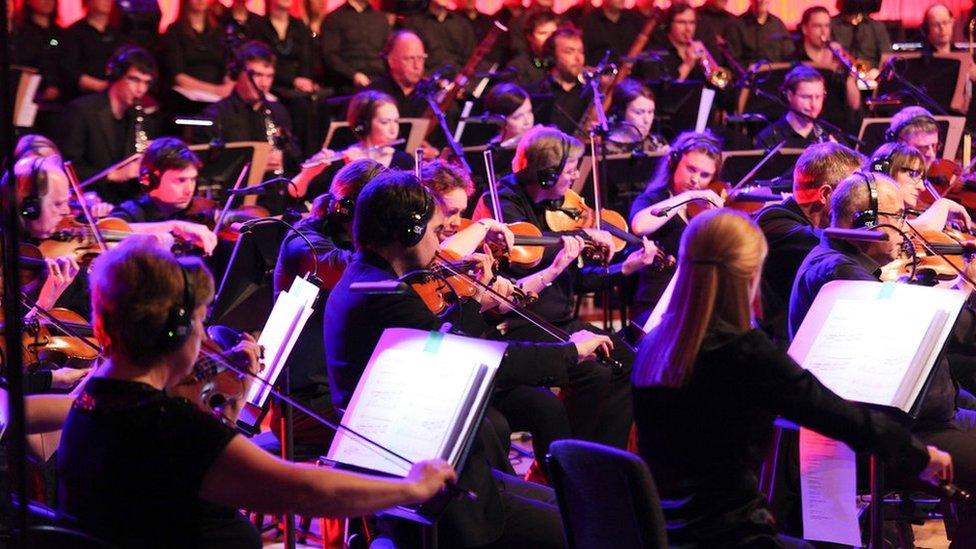Manchester Collective: Award-winning group on a mission to shake up classical music
- Published
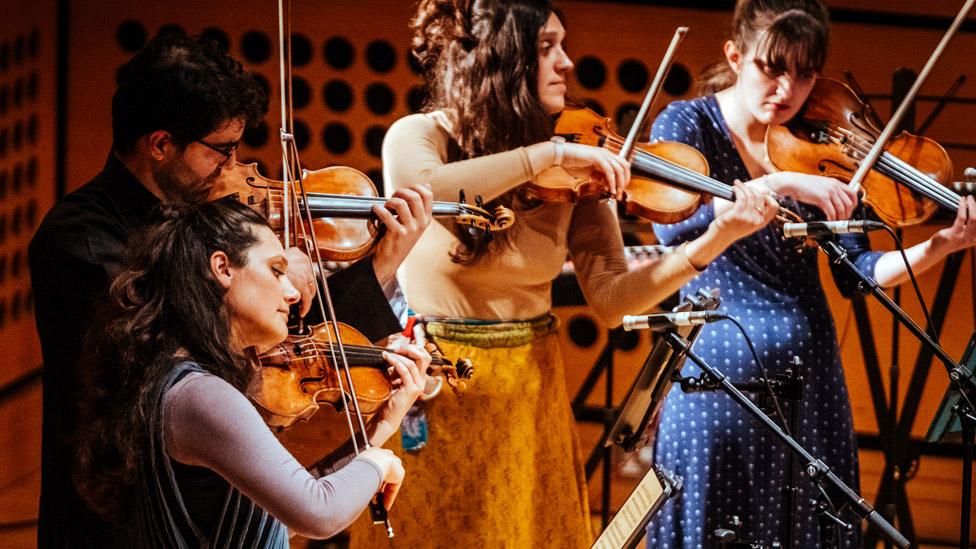
Manchester Collective try to make their concerts informal and intimate
Playing at venues ranging from a run-down nightclub to the Royal Albert Hall, the Manchester Collective are - according to the judges of one recent major award - "transforming all our perceptions" of what a classical music group can be.
Glance at Manchester Collective's gig diary and you'll see conventional, comfortable concert venues like the Albert Hall for the BBC Proms this summer, the Southbank Centre in London, and the Bridgewater Hall in their home city.
Other dates, meanwhile, are a long way from the traditional classical circuit. Like a nightclub in a former MOT garage in Salford, an indie venue in a former nightclub in Birkenhead, a warehouse in Leeds and a multi-storey car park in Peckham.
Those venues don't always have the luxuries of plush concert halls. Like heating.
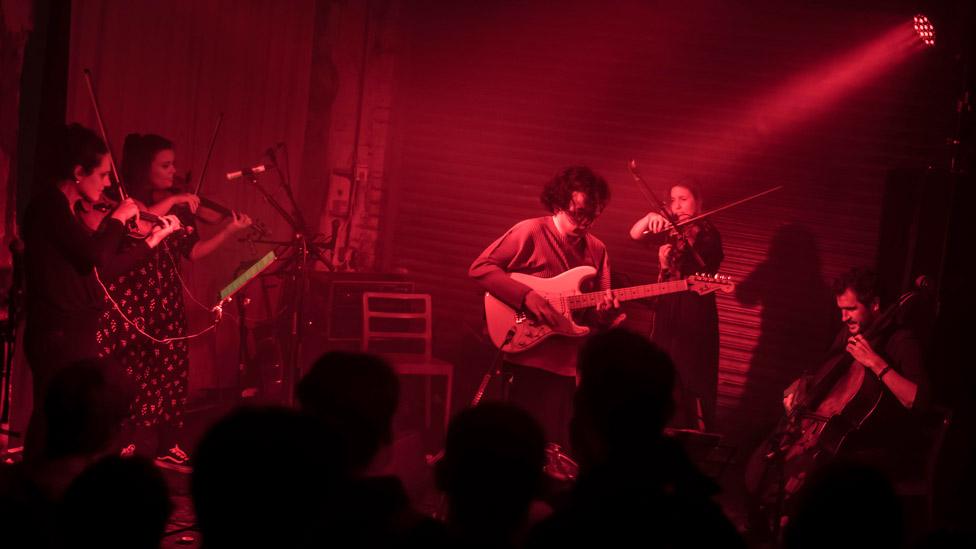
The Manchester Collective and Sean Shibe performing at the White Hotel, an MOT garage-turned-nightclub in Salford
"It can be very cold," says violinist and co-founder Rakhi Singh. "Sometimes I'm literally wearing three jumpers. And if you can't feel your fingers and you're trying to play something quite technical, it can be quite an obstacle.
"If the atmosphere is damp, your instrument reacts to that and it feels very different. So you have to be less precious.
"And you can hear the dogs barking outside and the clink of glasses. It's good."
The atmosphere - even if damp - makes up for the lack of velvet surroundings. "It always feels electrifying," Singh says.
And the intimacy helps too, according to co-founder and chief executive Adam Szabo.
"When it's 150 people standing crammed into a small room and you're closer to the musicians than you would ever be at the [Royal] Festival Hall or Bridgewater or whatever, it does feel like it's this tightrope, and it has a sense of jeopardy and danger in the performance," he says. "The best kind of risk."
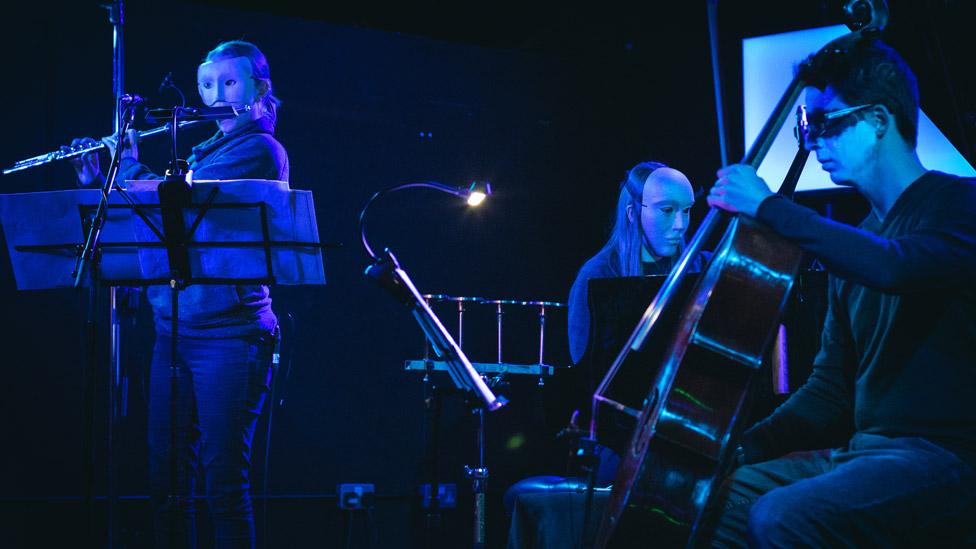
Musicians wearing masks to perform at Future Yard, an indie gig venue Birkenhead
As well as performing in a range of venues, Manchester Collective play around with instruments, lighting, visuals, amplification and staging. Recent tours have seen them perform with South African showman cellist Abel Selaocoe and sublime Scottish guitarist Sean Shibe.
They can have between two and 20-something musicians on stage, who can sometimes sing, address the audience, and don't have to stick to a dress code.
They can also get involved in commissioning and choosing the music, rather than just being hired to turn up and play.
Singh and Szabo formed Manchester Collective in 2017 after becoming frustrated at the classical music establishment's often rigid ideas and ways of working. They also wanted to attract a more diverse audience.
"In the vast majority of cities and concert halls around the country and around the world, the audiences felt very homogenous," says Szabo, who's from Australia but trained on the cello alongside Selaocoe in Manchester and has never left.
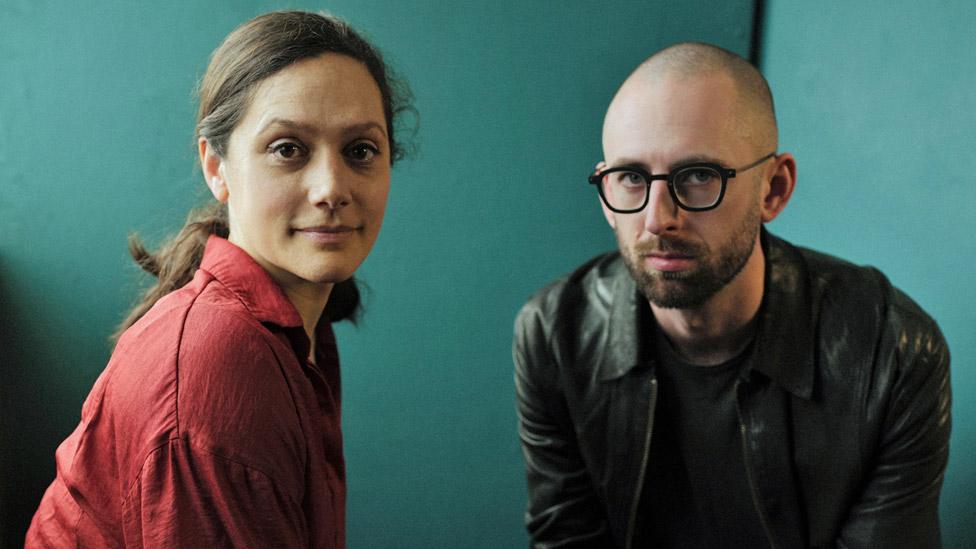
Rakhi Singh and Adam Szabo formed the ensemble after spending years performing for orchestras
"I don't think it's controversial to say that in the UK, the classical music sector is currently in an unsustainable cycle. The funding and financial support is going down, we're struggling for audiences," he says.
"At the same time, the audience for classical music is the least diverse, I think, of all of the art forms. We know that things have to change."
Manchester Collective's job, he says, is "to help to reposition classical music so it's close to the heart of cultural life in the UK, rather than being a peripheral frippery for the few rather than the many".
They aren't the only people trying to shake up the classical music world - many orchestras will point to attempts to innovate and widen access. But Manchester Collective's efforts have begun to be recognised.
Their collaboration with Selaocoe has just been nominated for the classical music prize at the South Bank Sky Arts Awards, and they were named best ensemble at the recent Royal Philharmonic Society Awards.
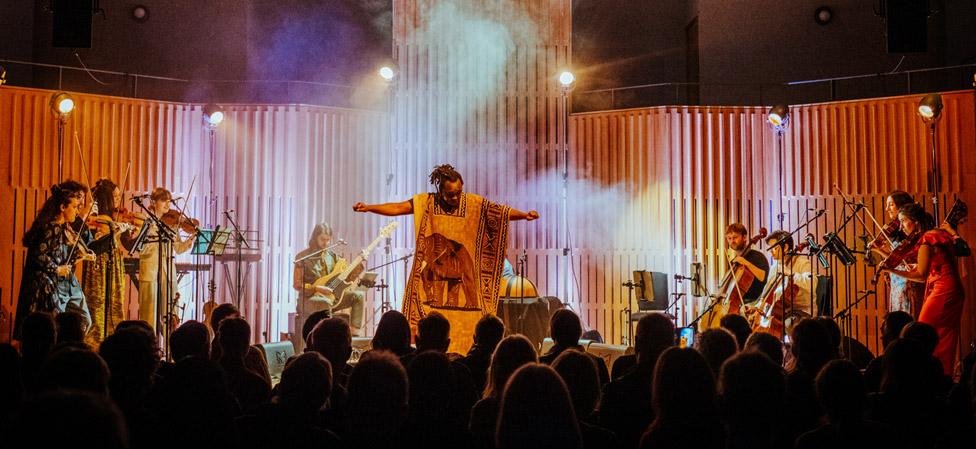
Abel Selaocoe (centre) was named best instrumentalist at the RPS Awards after his electrifying tour with Manchester Collective
The RPS judges said: "Manchester Collective is riding an extraordinary wave, changing the vocabulary of how classical music is presented. From Birkenhead to the BBC Proms, it's joyous to be in the audience and feel part of their collective passion.
"They are transforming all our perceptions of what an ensemble can be."
One of the collective's commissions, Ben Nobuto's Serenity 2.0, also won best chamber-scale composition, while Selaocoe was named best instrumentalist at the same ceremony.
For their next project, they are turning to opera, staging a new version of Benjamin Britten's Noye's Fludde, now dubbed Noah's Flood, with equally radical theatre company Slung Low.
The first performance will be in Slung Low's warehouse in Leeds on Friday as part of the city's year of culture, before a show in a former railway depot for the Manchester International Festival.
It will also star several hundred school children and poet Lemn Sissay. "The whole thing has this very sort of DIY, artisanal aspect," says Szabo. "Of course, we're big fans of Britten's music. It's a great score. And we've got Lemn Sissay playing God. What more could you ask for in this life?"
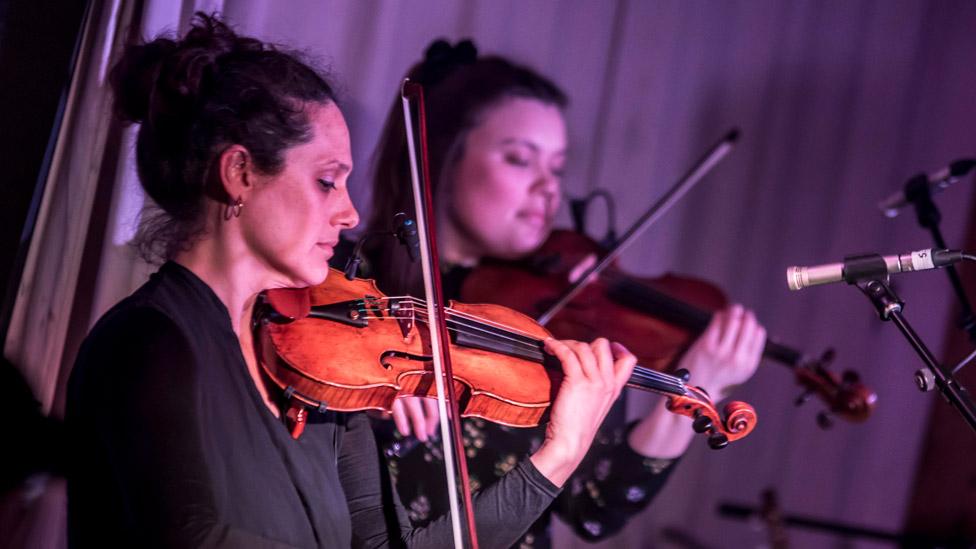
Manchester had "a bit of a clean-up" at the Royal Philharmonic Society Awards, says Singh (left)
It is perhaps no coincidence that the collective has emerged from Manchester. The city has a healthy classical music scene - from the Royal Northern College of Music to the Manchester Camerata, BBC Philharmonic and Halle Orchestra - but a lower cost of living than London.
"The nice thing is that Manchester has still not hit that tipping point where it's an unaffordable city for that work to take place in," Szabo says.
"For what artists are paid in this country, many of them are now priced out of the capital, and it's only really affordable for those big cultural behemoths to work [there].
"Whereas we play a chunk of our season at this quite notorious nightclub in Salford called the White Hotel. They're a bunch of art school kids that took over an MOT garage and now they have one of the most respected clubs in Europe.
"That can happen in Manchester. Can that still happen in London? Maybe… if you go a long way out. But you kind of have to have a rich mum and dad or to be part of that establishment already."
Singh warns that the collective's home city must not price artists out too in the future. "As Manchester grows, and there's a lot of development happening, it's going to be really important to keep hold of spaces like this, because it does bring a spice to the cultural life," she says.
"And if that gets pushed out, I think it just becomes homogenous and the city will suffer in its cultural identity.
"It was interesting being at the Royal Philharmonic Society Awards in March, because Manchester did have a bit of a clean-up."
Szabo continues that the collective has also benefited from a "spirit of invention which has always existed in the north".
"That feels like a very exciting creative energy, as well, for us to be a part of."
Noah's Flood is at the Warehouse in Holbeck, Leeds, on Friday, 7 July; and Depot Mayfield, Manchester, on Sunday, 9 July.
Related topics
- Published29 June 2023

- Published20 April 2023

- Published15 December 2022

- Published6 December 2022
